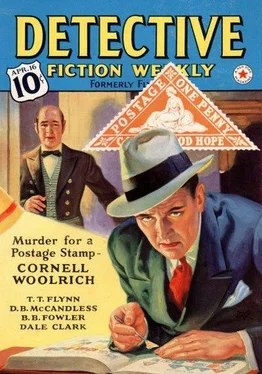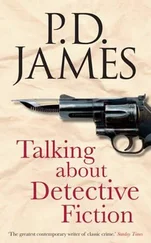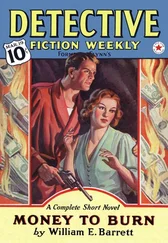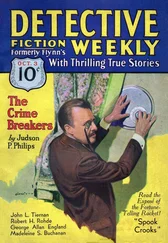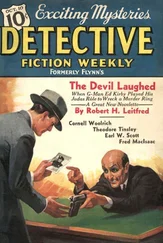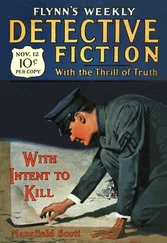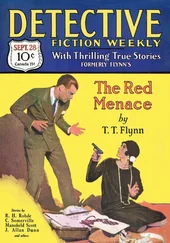Лоуренс Трит - Detective Fiction Weekly. Vol. 118, No. 6, April 16, 1938
Здесь есть возможность читать онлайн «Лоуренс Трит - Detective Fiction Weekly. Vol. 118, No. 6, April 16, 1938» весь текст электронной книги совершенно бесплатно (целиком полную версию без сокращений). В некоторых случаях можно слушать аудио, скачать через торрент в формате fb2 и присутствует краткое содержание. Город: New York, Год выпуска: 1938, Издательство: The Red Star News Company, Жанр: Детектив, на английском языке. Описание произведения, (предисловие) а так же отзывы посетителей доступны на портале библиотеки ЛибКат.
- Название:Detective Fiction Weekly. Vol. 118, No. 6, April 16, 1938
- Автор:
- Издательство:The Red Star News Company
- Жанр:
- Год:1938
- Город:New York
- ISBN:нет данных
- Рейтинг книги:3 / 5. Голосов: 1
-
Избранное:Добавить в избранное
- Отзывы:
-
Ваша оценка:
- 60
- 1
- 2
- 3
- 4
- 5
Detective Fiction Weekly. Vol. 118, No. 6, April 16, 1938: краткое содержание, описание и аннотация
Предлагаем к чтению аннотацию, описание, краткое содержание или предисловие (зависит от того, что написал сам автор книги «Detective Fiction Weekly. Vol. 118, No. 6, April 16, 1938»). Если вы не нашли необходимую информацию о книге — напишите в комментариях, мы постараемся отыскать её.
Detective Fiction Weekly. Vol. 118, No. 6, April 16, 1938 — читать онлайн бесплатно полную книгу (весь текст) целиком
Ниже представлен текст книги, разбитый по страницам. Система сохранения места последней прочитанной страницы, позволяет с удобством читать онлайн бесплатно книгу «Detective Fiction Weekly. Vol. 118, No. 6, April 16, 1938», без необходимости каждый раз заново искать на чём Вы остановились. Поставьте закладку, и сможете в любой момент перейти на страницу, на которой закончили чтение.
Интервал:
Закладка:
He’d subjected it to this test repeatedly after the first devastating discovery — even performed it for the police to prove his point. He wondered, therefore, why he bothered repeating it at this late date. Was it, he reflected with a twinge, just the excuse, given to himself by himself, for getting the stamp out of the album?
He took it out of the pan, left it on a sheet of blotting paper for the air to dry it. But then he didn’t wait — he put the album back without it, locked the wall safe. It stayed there on the blotting paper as though he’d forgotten it. He hadn’t. He was fighting a battle with himself, a battle that gave no outward sign.
Foster didn’t bother to ring the doorbell when he arrived, just stayed in the car and tooted the horn. Hobart went out to him, leaving the stamp behind. He seemed to have won the battle.
He shook hands, asked the detective hospitably: “Care to come in a minute for a drink before we go?”
Foster gave him a humorously rueful look. “On duty? I’d like to keep my job a little longer.” He opened the car door for him.
“Just a minute,” Hobart said abruptly. “I forgot something.” He went back into the house. He had forgotten something. Something innocent, as yet. The watermark detector, with which he’d been meaning to test Harding’s Cape triangular on the sly.
But when he left the den the second time, the stamp wasn’t there on the blotter any more. He’d lost the battle.
A colored man with the mournful eyes of a dog that has lost its master opened the door for them at Harding’s house. A tall stately woman garbed in black was coming down the stairs as they entered.
“Mrs. Adams, this is Mr. Hobart,” said the detective, “He’s a stamp enthusiast like Mr. Harding was. He’s been good enough to put his expert knowledge at our disposal.”
She gave Hobart a warm look, as though the fact that he and her father had something in common was enough to make her look favorably on him. “I used to see him with the stamps so often,” she said sadly. “Cruel, isn’t it, Mr. Hobart?” She raised a handkerchief quickly to her lips, then regained control of herself.
Foster went into the murder room, unlocked the secretary, took out the albums for Hobart. Then Foster rejoined Mrs. Adams in the hall. She had, for obvious reasons, not stepped into the room.
Hobart seated himself at the table, shot back his cuffs, and resumed his “auditing.” He took up where he had left off the night before, and in a very few minutes had reached and passed the triangular. Without moving facial muscle he raised his eyes to the open doorway, dropped them again.
A moment later, without any warning, the darky was standing there in the doorway, coughing apologetically. Hobart looked up a second time without showing any emotion, although something like a short circuit had just gone through his system.
“Beg pardon, suh. Mrs. Adams like to know can I git you any refreshment while you wukking?”
“Thank you. A glass of water,” said Hobart pleasantly.
The darky brought it in on an expensive chased-silver platter, set it down on the table, withdrew tactfully. Hobart heard his almost inaudible tread go up the stairs to the floor above. Mrs. Adams and the detective had also gone there some time before this. Evidently there was an attic or storeroom full of trunks containing old letters and documents that claimed their attention.
Now was as good a time as any.
Hobart fished out his watermark detector surreptitiously and placed it on his lap under the table. He stuck two fingers into the drinking glass, traced their moistened tips along the bottom of the detector. Then he took up Harding’s tweezers, fixed them on the stamp and gently peeled it off its hinge and free of the album. He dropped the stamp face down onto the glistening tray.
Wrist shaking a little, he raised the tray up above table level, where the light could get at it freely. The black of the tray slowly peered through the soggy stamp in a series of tracings that finally resolved themselves into the British royal crown with the initials V R .
It was genuine, it was the real thing! It was the third Cape triangular, either from the dispersed Ferrari collection or the lost Romanoff one! His head swayed back until it almost struck the tall chair-back behind him; he tightened his neck muscles, pulled his head sharply forward again.
Its monetary value was no temptation to him. He didn’t think of it in that way at all, of what he could get for it. His collector’s instinct cried out for its possession, to keep, to hide away, even though no other living eve but his own ever saw it again. He thought: “Harding’s dead now. I’m not robbing anyone at all. She doesn’t understand stamps or care two pins about them. Nor does she need the money they might bring. Who’ll ever know the difference? Who’ll ever be the wiser? It’s not as though I intended to dispose of it afterward, run the risk of exposure. It’ll stay with me forever, and no one ever sees my collection but myself.”
He took the stamp out of the tray and placed it on the table, to let the dampness evaporate. He reached in his pocket, brought out his own, the counterfeit. He held them close to each other. So very much alike, so identical in every detail of coloring and engraving. Only that betraying little watermark.
But he kept fighting it out, as he had at his home. And the tide started to turn, the longer he hesitated. He was no thief. He’d never done anything like this before in his life. He wouldn’t have dreamed of doing a thing like this in business, appropriating a client’s account. If he did this now he was no better, no, he was far worse, than that long-ago sharper who had mulcted him . He could survive without this particular stamp. He had plenty of other rarities in his collection. And if no one ever looked at his albums but himself, all the more reason for being satisfied with the counterfeit he’d had all these years. But there was this collector’s fever to contend with, this vague instinct for perfection, for fulfillment, that craved the satisfaction of knowing he possessed the genuine one, even though nobody else ever would.
In the end he might have won out overcome the temptation, but circumstances defeated him. The front doorbell rang sharply, and the colored butler’s tread started down the stairs to answer it. Again he dabbed a finger into the glass of water, and stroked it across the hinge that had remained in the album, renewing its adhesive properties.
There was no excuse. The outer door had already opened, but there was equal time left to have replaced either one in the frame, the counterfeit or the genuine. He put back the forgery he had brought from his own house, and pressed it down until it remained fixed fast on the hinge. Then he put his other hand down on the tabletop, covering the real one, just as Broderick came into the room.
“Hello, Hobart,” the detective greeted him guilelessly. “How you coming along? Where’s Foster, upstairs? We just picked up a suspicious character that was seen roaming around this vicinity two days ago.” He went out again to the foot of the stairs, called his fellow worker down.
Hobart had only to lift his hand from the table. The stamp, still damp, adhered to his palm. He thrust his hand into his side pocket, and when he brought his hand out again it was empty.
Foster’s voice was raised, outside in the hall, in argument with his teammate. “You’re crazy! Harding would never have let anyone of that description into the house in the first place, and if he had gotten in he would have swiped everything he could lay his hands on, you bet.... All right, I’ll go down and question him, but you’re way off on the wrong track, I tell you!”
Читать дальшеИнтервал:
Закладка:
Похожие книги на «Detective Fiction Weekly. Vol. 118, No. 6, April 16, 1938»
Представляем Вашему вниманию похожие книги на «Detective Fiction Weekly. Vol. 118, No. 6, April 16, 1938» списком для выбора. Мы отобрали схожую по названию и смыслу литературу в надежде предоставить читателям больше вариантов отыскать новые, интересные, ещё непрочитанные произведения.
Обсуждение, отзывы о книге «Detective Fiction Weekly. Vol. 118, No. 6, April 16, 1938» и просто собственные мнения читателей. Оставьте ваши комментарии, напишите, что Вы думаете о произведении, его смысле или главных героях. Укажите что конкретно понравилось, а что нет, и почему Вы так считаете.
